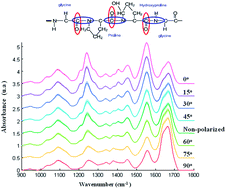Changes of skin collagen orientation associated with chronological aging as probed by polarized-FTIR micro-imaging†
Abstract
During chronological skin aging, alterations in dermal structural proteins cause morphological modifications. Modifications are probably due to collagen fiber (type I collagen) rearrangement and reorientation with aging that have not been researched until now. FTIR microspectroscopy appears as an interesting method to study protein structure under normal and pathological conditions. Associated with a polarizer, this vibrational technique permits us to probe collagen orientation within skin tissue sections, by computing the ratio of integrated intensities of amide I and amide II bands. In this study, we used the polarized-FTIR imaging to evaluate molecular modifications of dermal collagen during chronological aging. The data processing of polarized infrared data revealed that type I collagen fibers become parallel to the skin surface in aged skin dermis. Our approach could find innovative applications in dermatology as well as in cosmetics.


 Please wait while we load your content...
Please wait while we load your content...